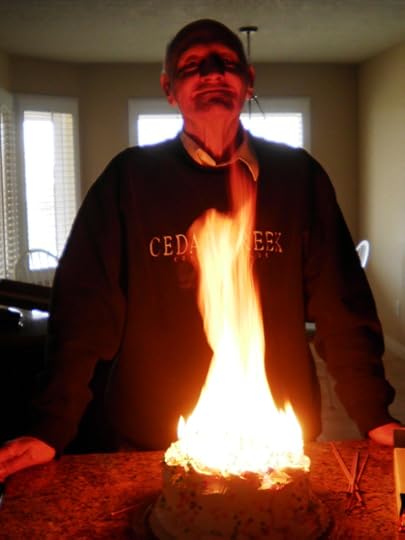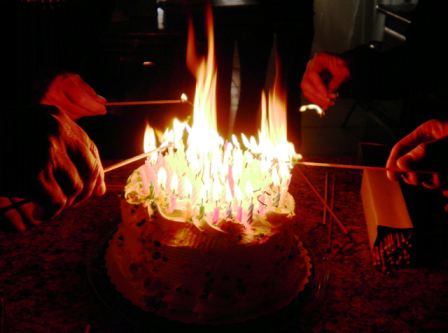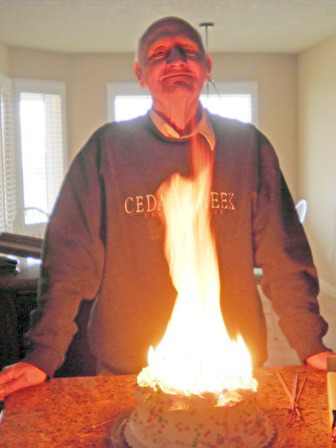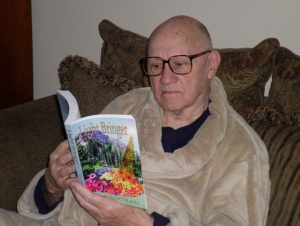Pat Bertram's Blog, page 244
February 7, 2013
Finding a New Life that Fits Properly and Looks Good
 In a conversation with a friend about my father, who is still going strong at 96, I said, “I take after my mother, which is good because there is no way I want to live to such an advanced age, particularly since I won’t have a widowed daughter to come stay with me. It’s kind of spooky thinking of having to grow old alone.”
In a conversation with a friend about my father, who is still going strong at 96, I said, “I take after my mother, which is good because there is no way I want to live to such an advanced age, particularly since I won’t have a widowed daughter to come stay with me. It’s kind of spooky thinking of having to grow old alone.”
She said, “You never know what will happen. Maybe a new love will drop into your life. I can imagine you at some writer’s festival and a distinguished stud with salt and pepper hair and a sweet smile flirts with you. He asks for your number and the next thing the rest of us know, Pat’s out dancing and dining every Saturday night and she’s suddenly submitting romance novels for publication…”
I laughed. “I love the ‘sweet smile’ part. Who knows, with or without a stud, I might go out dancing every Saturday night. I desperately need a new life.”
She responded, “I think you need a new life too. I’m afraid you’re just wilting away. So — how do you get a new life? What do you want your new life to be?”
And that’s where the conversation stalled. How do you get a new life? It’s not as if you can go to the mall and search the aisles at Lifes ‘R’ Us until you find a new life that fits properly and looks good. (Though that does sound like an interesting concept.)
What-we-can-become is dependent on whether what-we-are is an integral part of our genetics, keeping us always “us,” or if we are infinitely mutable and can become whatever we wish to be despite our inborn proclivities. In other words, can we really get a new life or are we always “us”?
For me to go out dancing every Saturday night, I’d need a personality transplant. I’ve always been drawn to quiet activities, such as dinner and conversation that dances from one topic to another. If somehow I did overcome my natural inclination for such sedentary pursuits, where would I go dancing? I’m too old for nightclubs and too young for senior citizens groups.
Still, I will need a new life of some sort. My father will not live forever, and I will need to decide where to go and what to do. And the truth is, I haven’t a clue.
Current research by Harvard psychologist Daniel Gilbert shows that while we can see how much we have changed in the past, we never think we will change in future. (Hence that ill-advised tattoo you got when you were young and now wonder what you were thinking.) But this isn’t always true. I know how much I have changed in the past. I have a photo of me as a baby, and I can see the vast changes between me and that poor befuddled creature. I can also see how different I am today from what I was four years ago when I watched my life mate/soul mate’s slow descent into death, and I can see how different I am from what I was almost three years ago when grief catapulted me out of that shared life into a new one. I can extrapolate from those experiences of change that I will also drastically change in the future.
I always feel the same, of course. — just me. (There must be some sort of mechanism, like an internal gyroscope, that keeps us “us” no matter how we change.)
The point is that I cannot figure out now what I want my life to be when I am free to pursue that life because I don’t know who or what I will be at the time. Maybe by then, I’ll miraculously have developed grace and style, and will have become a dancing queen. Or not.
***
Pat Bertram is the author of the suspense novels Light Bringer, More Deaths Than One, A Spark of Heavenly Fire, and Daughter Am I. Bertram is also the author of Grief: The Great Yearning, “an exquisite book, wrenching to read, and at the same time full of profound truths.” Connect with Pat on Google+
Tagged: a new life, changing, expecting to change, getting a new life, grace and style, personality transplant

February 6, 2013
Driving with “Big Brother”
 I just got a notice from my car insurance company telling me that if I have a 1996 or newer vehicle and have In-Drive, or a 2004 or newer vehicle equipped with OnStar, I can save big money on my insurance.
I just got a notice from my car insurance company telling me that if I have a 1996 or newer vehicle and have In-Drive, or a 2004 or newer vehicle equipped with OnStar, I can save big money on my insurance.
They, of all people, know that my car is much older than that, but insurance companies are not in the business of thinking, apparently, and just mindlessly stuffed the mailing envelope with whatever was within reach. Still, being one of those people who reads whatever falls into her hands, I examined the brochure. It said that if a vehicle is equipped with one of those devices, the information collected can be shared directly to the insurance company in return for a discount. That stunned me into verbosity. (Hence this bloggerie.) It seems unreal that people allow so much intrusion into their lives just to save a few dollars.
In-Drive is a device that records the number of miles a vehicle is driven, how the vehicle is driven, where the vehicle is driven. It also includes features such as automatically summoning assistance in case of emergency and receiving alerts about how a teenage dependent might be driving the vehicle.
OnStar is a service that offers emergency, security and hands-free calling services along with diagnostics reports and mileage records and other features.
Both these services seem as if they’d be helpful to drivers, but sending that information to an insurance company smacks of Big Brother. Sharing that information is optional now, but as such services become commonplace, chances are that insurances companies could compel drivers to have the information sent directly to them. (There must be a story in there somewhere. Maybe the murder of an insurance agent, and the villain needs to find a way to escape undetected? Maybe not. It sounds familiar, and anyway, Big Brother has been done to death — at least in fiction.)
If you are a safe driver (or rather, if the device decides you are a safe driver) you could potentially save 50%, but that’s only if you drive less than 500 miles a year, and even I, who drives but once or twice a week, puts on more miles than that. A more realistic mileage is about 8,500 miles per year. At that mileage, a safe driver could save 25%, while an average driver would save only 16%.
It makes me wonder how many people expect to get a “safe driver” rating only to find out they are an average or high-risk driver. (All drivers assume they are great drivers, but it only takes a few minutes on a busy road to see that most drivers overestimate their ability.)
Still, 16% could add up to a bit of a savings, but . . . (yep, there’s that “but” that always seems to show up in my blog posts) the OnStar service, for example, can cost almost $30.00 a month, which you’d have to take into consideration when figuring out your savings.
This wasn’t quite the humorous blog I intended, but truthfully, surveillance of any kind spooks me.
***
Pat Bertram is the author of the suspense novels Light Bringer, More Deaths Than One, A Spark of Heavenly Fire, and Daughter Am I. Bertram is also the author of Grief: The Great Yearning, “an exquisite book, wrenching to read, and at the same time full of profound truths.” Connect with Pat on Google+
Tagged: In-Drive, insurance companies, OnStar, safe driver, saving money on car insurance, surveillance

February 5, 2013
Dreaming of a White . . . Everything
 I hate dreaming. I hate that feeling of bizarre, unexplainable things happening, and I hate remembering my dreams because they are most often unpleasant. Even more than dreaming, I hate hearing about other people’s dreams, but . . . (you knew there’d be a “but,” didn’t you?) this blog doubles as a journal — one with a search function — and someday perhaps I might want to use last night’s dreamscape in a story, so I decided to recount it. Feel free not to continue reading. I won’t mind. Truly.
I hate dreaming. I hate that feeling of bizarre, unexplainable things happening, and I hate remembering my dreams because they are most often unpleasant. Even more than dreaming, I hate hearing about other people’s dreams, but . . . (you knew there’d be a “but,” didn’t you?) this blog doubles as a journal — one with a search function — and someday perhaps I might want to use last night’s dreamscape in a story, so I decided to recount it. Feel free not to continue reading. I won’t mind. Truly.
In my dream, I was walking in the desert under a clouded white sky. The sand was pure white and windswept. The desert wasn’t flat, but looked hilly like the desert I’m familiar with, and those knolls were also covered with white sand. No vegetation grew in that desert. No dark rocks relieved the expanse of white. The ground seemed hard, but still I left deep footprints in the sand as I walked. I hadn’t gone far, just about a quarter of a mile or so, and when I looked back, I could barely see my footprints, which were quickly being refilled by the white sand. With no vegetation or rocks standing out as landmarks to help me find my way, I feared getting lost, so I turned and followed my footprints back the way I came.
As I walked, three white horses sped across my path, then four white bunnies in a bunch, then one at a time, two small white squarish creatures I could not identify, and then finally, one immense white owl.
I thought, “I must be dreaming because such magical and mystical things don’t happen in real life,” but that world and my feelings of reality were so solid it didn’t feel like a dreamscape. Still, I tried to peel back the veneer of the dream and wake myself up, and when I didn’t wake, I figured it was no dream.
All the creatures passed into the whiteness of the desert except for the owl, who stood watching me. I stood, too, and looked at the work being done on a nearby fenced-in building — a small domed structure that apparently was a relic of conquistador days. Some boys had found a stash of lances and spears, and a woman was saying to the project manager, “We can let them have a couple. It won’t hurt anything.”
I laughed at that, which made my dreaming self think I really was awake since I had never heard myself laugh in dreams.
Eventually, I did awake from that dream, but into another dream where I told the man who’d been the project manager in the previous dream about the strangely solid and realistic-feeling dream I had. I woke from that dream into a third one that was muddled and nightmarish the way my dreams usually are, and then, at long last, I woke into the real world.
Or did I? Perhaps this is just another dream from which one day I will awaken.
***
Pat Bertram is the author of the suspense novels Light Bringer, More Deaths Than One, A Spark of Heavenly Fire, and Daughter Am I. Bertram is also the author of Grief: The Great Yearning, “an exquisite book, wrenching to read, and at the same time full of profound truths.” Connect with Pat on Google+
Tagged: dream journal, dreaming, dreaming of white, dreamscape, trying to wake from a dream, white horses


February 4, 2013
More Incendiary Photos
Yesterday I posted a couple of photos from my father’s ninety-sixth birthday party, and here are a couple more where he looks very wizardly. (The second one is actually the unretouched photo I posted for the benefit of Rami Ungar, whom I sure you know through his comments on this blog.)
In retrospect, perhaps lighting 96 candles wasn’t the smartest thing to do. One brother who didn’t make it to the party emailed me and asked if everyone behaved. I responded, “You mean except for the part where we lit 96 candles?” He replied, “No EMTs were called, so that doesn’t count.”
What does count, though is that it was an adventure. My life is too staid and going nowhere fast, so I decided to go in pursuit of 101 adventures. Until the candle incident, the number of adventures I’ve had so far this year is zilch. Zero. Nada. So, now I have only 100 more to go. (The resolve for 101 adventures wasn’t really a New Year’s resolution, though the resolution was made on New Year’s Day, because there is no way I can fit that many adventures into a single year and still look after my father.
***
Pat Bertram is the author of the suspense novels Light Bringer, More Deaths Than One, A Spark of Heavenly Fire, and Daughter Am I. Bertram is also the author of Grief: The Great Yearning, “an exquisite book, wrenching to read, and at the same time full of profound truths.” Connect with Pat on Google+
Tagged: ninety-six candles, ninety-sixth birthday


February 3, 2013
96 Candlepower — Don’t Try This Without a Fire Extinguisher Handy!
Yesterday was my father’s ninety-sixth birthday. I never had any intention of putting candles on the cake, but my brother brought four boxes of 24 birthday candles which added up to exactly 96, so it seemed a fitting sign. Besides, there didn’t seem to be very many of them when they were sitting side by side so innocuously in the boxes. Luckily (or maybe unluckily) we had fireplace matches, which are about eight inches long, otherwise those candles would never have been lit. Still, it took four people to light the candes before they burnt out.
Once the candles were lit, they became a single flame, so I never did get to see ninety-six tiny candle flames cheerfully paying homage to all those years.
As my brother said, “In retrospect, maybe this wasn’t such a good idea.” Next year, we’ll get the candles with numbers, but when my father hits 100, we’ll go for 100-candlepower, but maybe a bigger cake . . .
***
Pat Bertram is the author of the suspense novels Light Bringer, More Deaths Than One, A Spark of Heavenly Fire, and Daughter Am I. Bertram is also the author of Grief: The Great Yearning, “an exquisite book, wrenching to read, and at the same time full of profound truths.” Connect with Pat on Google+
Tagged: candlepower, ninety-six candles, ninety-six years old, ninety-sixth birthday


February 2, 2013
Who Wants to Live to Be Ninety-Six?
I don’t want to live to be ninety-six, and chances are you don’t either, so who wants to live to be ninety-six? Ninety-five year olds, that’s who!
Today is my father’s ninety-sixth birthday. He’s one of the lucky ones. He is still living in his own house with a daughter (me) helping keep him independent.
We get along well for the most part, but he doesn’t understand my sense of humor. He asked me the other day if it was normal for someone his age to sleep so much. I said, “I don’t know. Most people your age are dead.” In the long drawn-out explanation that followed (I meant only that most people don’t live to such an advanced age), any vestige of humor was lost.
A couple of my brothers will be stopping by for a small party. There will even be cake, but without the candles. Can you imagine the heat generated by 96 candles? Or how long it would take to light them? Besides, blowing them all out would probably kill my father and bring the festivities to an end. And anyway, that whole tradition of having someone blow on a cake before you eat it is unsanitary at best.
In case you’re wondering, 96 years is 35065 days.
Pat Bertram is the author of the suspense novels Light Bringer, More Deaths Than One, A Spark of Heavenly Fire, and Daughter Am I. Bertram is also the author of Grief: The Great Yearning, “an exquisite book, wrenching to read, and at the same time full of profound truths.” Connect with Pat on Google+
Tagged: birthday, ninety-six years old

February 1, 2013
My New New Year
 2013 began with tears. I’m still not sure why, though it probably has to do with a deeper acceptance of my life mate/soul mate’s goneness coupled with the slide toward the third anniversary of his death. You’d think with such a sad beginning to the year that things would ony get better, but my life went downhill from there until I felt as if I were drowning in sadness. So, in an effort to change my outlook, I decided to start the year over.
2013 began with tears. I’m still not sure why, though it probably has to do with a deeper acceptance of my life mate/soul mate’s goneness coupled with the slide toward the third anniversary of his death. You’d think with such a sad beginning to the year that things would ony get better, but my life went downhill from there until I felt as if I were drowning in sadness. So, in an effort to change my outlook, I decided to start the year over.
Last night at midnight, I toasted in my new new year. It seemed such a silly thing to do, yet almost profound at the same time, that it made me smile. I have to admit, I did mist up briefly a little later when I put his photos away. Sometimes seeing them bring me comfort, but sometimes they only serve to remind me of what I have lost, and there is no place for the past in this new new year of mine. (At least not yet. I’m sure there will come a point when I need the small bit of comfort those photos can bring and will set them out again.)
I have to focus on what is, and what “is” is me alone. It’s hard to carry on any kind of relationship with someone who is dead. He doesn’t respond when I talk, doesn’t offer comfort when I need it, doesn’t hug me or smile at me. Not a very fulfilling relationship!
I’m not being entirely facetious, just trying to face the truth.
I’ve read that people who manage to have a relationship with their deceased loved ones are happier than those who shut out any memory of those who are gone, but still, it’s a one-sided relationship. And, to be honest, for me it’s better that way. Since I have to find my own path through the rest of my days, I’d just as soon not have a ghost hanging around, hampering whatever fulfillment I might find. (Hmmm. Is there a story in that?)
I started my new new year in an effort to gain a new focus (or do I mean a new new focus?) And so far, this new new year is going great. Not only can I still feel the effects of that midnight smile, but the weather is gorgeous — blue skies, warm air, the faintest of breezes — which was perfect for my long walk in the desert. Even better, I can feel a slight shift in my outlook, a turning away from the way I wish things were to the way things are and maybe even to the way things are meant to be.
I’m hoping I can continue this new new year the way it has begun, but if I begin drowning in sorrow again, I’ll just start over with a new new new year.
***
Pat Bertram is the author of the suspense novels Light Bringer, More Deaths Than One, A Spark of Heavenly Fire, and Daughter Am I. Bertram is also the author of Grief: The Great Yearning, “an exquisite book, wrenching to read, and at the same time full of profound truths.” Connect with Pat on Google+
Tagged: new focus, new new year, new year, relationship with the dead, starting over

January 31, 2013
Happy New Month’s Eve!
 When I looked at the day on my cell phone today and noticed it was the 31st, my first thought was, “New Years Eve, already?” It felt good thinking that this year was over, and that a new one would begin in just a few hours, and then the truth sunk in — this year would not be over for another eleven months.
When I looked at the day on my cell phone today and noticed it was the 31st, my first thought was, “New Years Eve, already?” It felt good thinking that this year was over, and that a new one would begin in just a few hours, and then the truth sunk in — this year would not be over for another eleven months.
This has not been a good year so far — not the worst by a very wide margin, but not good, either. It began inexplicably with tears, and grief has been with me most of the month. (In less than two months, it will be three years since the death of my life mate/soul mate, and that anniversary looms large on my emotional horizon.)
It’s not just the grief upsurge that has made this a hard month — there have been too many disappointments and setbacks for such a new year. Friendships have ended, a project with other authors has come to an ignoble conclusion, new hopes have not been realized, blog and book ratings have fallen. There have been some good things. For example, I was notified that Grief: The Great Yearning came in second place for a book award, but any pleasure in that recognition was destroyed when I got a follow-up email telling me I’d been demoted to third place. (I’m still reeling from that one. I’ve never heard of anyone being demoted before.)
I need a new start, and I’m going to make one. In a way, every day is the eve of a new year, but today is also the eve of a new month, which seems an auspicious time to begin. So, Happy New Month’s Eve! Wishing you a great new start and much happiness during the coming month.
***
Pat Bertram is the author of the suspense novels Light Bringer, More Deaths Than One, A Spark of Heavenly Fire, and Daughter Am I. Bertram is also the author of Grief: The Great Yearning, “an exquisite book, wrenching to read, and at the same time full of profound truths.” All Bertram’s books are published by Second Wind Publishing. Connect with Pat on Google+
Tagged: loss, new month, new start, New Year’s Eve

January 30, 2013
Rubicon Ranch: Necropieces — The Story Continues
 Rubicon Ranch is a collaborative and innovative crime series set in the desert community of Rubicon Ranch and is being written online by the authors of Second Wind Publishing. Seven authors, including me, are involved in the current story — Rubicon Ranch: Necropieces.
Rubicon Ranch is a collaborative and innovative crime series set in the desert community of Rubicon Ranch and is being written online by the authors of Second Wind Publishing. Seven authors, including me, are involved in the current story — Rubicon Ranch: Necropieces.
Residents of Rubicon Ranch are finding body parts scattered all over the desert. Who was the victim and why did someone want him so very dead? Everyone in this upscale housing development is hiding something. Everyone has an agenda. Everyone’s life will be different after they have encountered the Rubicon. Rubicon Ranch, that is.
Although some of the characters were introduced in Rubicon Ranch: Riley’s Story, a previous collaboration, Rubicon Ranch: Necropieces is a stand-alone novel.
We hope you will enjoy seeing the story develop as we write it. Let the mystery continue! Whodunit? No one knows, not even the writers, and we won’t know until the very end!
Chapter 34: Melanie Gray
by Pat Bertram
Sheriff Bryan turned off the highway onto Tehachapi Road and wound through Rubicon Ranch. Melanie gazed out the Navigator’s window at the beautiful houses. Although the buildings were typical California housing development architecture—stucco with tile roofs—many of the dwellings were custom-built, so none of the houses looked exactly like any other. Spanish, Moorish, and Mediterranean styles dominated, but Cape Cod designs, Greek revival porticos, and ranch-style houses were also prevalent.
It seemed strange, Melanie thought, that the lovely facades hid such horror—death, murder, dismemberment.
“When I took this job,” the sheriff said, “I figured Rubicon Ranch would be the least of my troubles. It seemed such a quiet place.” He shot a glance at her. “You find that funny?”
It had been so long since Melanie had smiled that it took a moment for her to realize her lips had quirked up in acknowledgment of their synchronized thoughts.
“Not funny, no. It’s just that the area does seem quiet and innocent, as if nothing bad could happen here. And from what I can tell, nothing bad happened until I came. First Alexander was killed, then Riley, then her father and her kidnappers, and now Morris. I know it’s foolish, but I can’t help feeling as if it’s all my fault.”
“Is it?” Bryan asked without a trace of friendliness.
“Note to self,” Melanie muttered. “Never confide in a cop.”
“What about if the cop confides in you? All hell is breaking loose in Rubicon Ranch, and I’d like to tell you what’s going on if that’s okay.”
“Ah, back to the nice cop. It’s amazing how you can do the good cop/bad cop routine all by yourself.”
“Bad cop?” He flashed a smile that could only be called a leer, but then he seemed to think better of it, and straightened his mouth into its normally stern lines. “Have you met Eyana Saleh? Egypt Hayes?”
“Haven’t met either of them.”
“It’s the same person. Petit woman, mixed heritage, new to Rubicon Ranch.”
“Oh! I’ve seen her. She’s always wandering around taking photos of the neighborhood. She’s beautiful and has such lovely skin. Eyana Saleh? That’s her name? It fits her. What has she done?”
“Right at the moment she’s in the hospital. Been beaten pretty bad. She’s not saying much, but one of her assistants found her and described the man she saw running from the house, and the description fits Jake Sinclair.”
“Have you arrested him yet?”
“He’s not going anywhere. He’s in the hospital too, just down the hall from Eyana. His arm was chewed almost to the bone.”
Melanie gaped at the sheriff. “Eyana ate him?”
“A coyote did, or so he says. Apparently, after he beat up Eyana, he ran off to the desert. That’s where the medivac helicopter picked him up. He’s not saying anything, either, though maybe when he finds out how unpleasant those rabies shots are, he’ll come clean. The doctor says it’s definitely a canine bite though he guesses it’s a domesticated creature. The only dog in the area that I know of that’s big enough to do so much damage so quickly is the bull mastiff Tara Windsor owns, but she’s keeping mum, too.”
“Tara Windsor is in Cabo with her pool boy.”
“What? How do you know?”
“My agent. She’s a celebrity hound.”
Sheriff Bryan tapped a long, well-shaped finger on the steering wheel. “So, a woman comes to town looking like Tara, telling everyone her name is Leia Menendez, wink, wink, leading everyone to believe that she’s the actress but is really Leia? Whoa. If Tara could act that good, she’d be a shoo-in for an Oscar. Playing Lizzy Borden, maybe. An axe was found in the Sinclair house under Jake’s bed. We think Leia put it there, but our witness is a bit unreliable since she was having hysterics at the time.”
“And here I thought the life of a cop was boring,” Melanie said. “All routine and paperwork.”
“Not boring enough. The witness is Nancy Garcetti, a real estate agent. She found Morris’s head in the Peterson house and went flying down the street, screaming all the way. She says while she waited for my deputies to arrive, she saw Tara Windsor sneaking around the side of the Sinclair’s house, and Tara was carrying something that looked like an axe. We can’t find any other witnesses, and Tara or Leia or whatever her name is, isn’t admitting anything.”
“Is it the axe that killed Morris?”
Bryan shook his head. “The ME says not. He says it’s animal blood, thin blood, like from a roast. Then, as if this isn’t enough of a circus, we have electric boy. Ward Preminger.”
“I know who you mean,” Melanie said. “He’s also new to the neighborhood. Seems to crackle with static electricity. Has a fixation with the Morris house.”
The sheriff turned onto Delano Road. “As near as we can figure it, Ward blamed Morris for his condition, though apparently his brain got rewired when he was zapped by lightning while trapped in a tornado. He—” The chirping of a cell phone interrupted him. Bryan pulled the device out of a sheath on his belt and held it up to his ear. “Yes,” he said. “Yes . . . Okay . . . Sure . . . Thanks . . . Be right there.”
He sheathed his phone. “I have to go. We got the preliminary autopsy reports.” He made a quick u-turn and pulled up in front of Melanie’s rented house.
Melanie climbed out of the vehicle and stood on the curb until the Navigator sped out of sight, then she trudged to her front door, unlocked it, and entered the silent house.
***
Pat Bertram is the author of the suspense novels Light Bringer, More Deaths Than One, A Spark of Heavenly Fire, and Daughter Am I. Bertram is also the author of Grief: The Great Yearning, “an exquisite book, wrenching to read, and at the same time full of profound truths.” Connect with Pat on Google+
Tagged: grief and loss, online novel, Rubicon Ranch, Rubicon Ranch Necropieces, Second Wind Publishing

January 29, 2013
Saying Good-bye
 During the past three years, I’ve met way too many people who have lost their mates. (Until I became one of them, I had no idea the vast numbers of people living with such grief). Some, like me, lost their mates through a long dying. Others lost them instantly. I’ve never been able to figure out which is worse for survivors to deal with. The quick deaths bring such shock and disbelief that it seems impossible to survive, but we who have plenty of time to get used to the idea have to deal with the memories of our lack of generosity toward our long-dying mates. The trouble is that when someone dies slowly, as the months and maybe even years pass, we get used to their dying. The dying itself becomes a way of life, so that a flash of irritation here or a lack of empathy there means little in the fullness of the days. It’s only when they are gone that these things loom large, and we wonder why we couldn’t have held to our equanimity just a couple of months longer.
During the past three years, I’ve met way too many people who have lost their mates. (Until I became one of them, I had no idea the vast numbers of people living with such grief). Some, like me, lost their mates through a long dying. Others lost them instantly. I’ve never been able to figure out which is worse for survivors to deal with. The quick deaths bring such shock and disbelief that it seems impossible to survive, but we who have plenty of time to get used to the idea have to deal with the memories of our lack of generosity toward our long-dying mates. The trouble is that when someone dies slowly, as the months and maybe even years pass, we get used to their dying. The dying itself becomes a way of life, so that a flash of irritation here or a lack of empathy there means little in the fullness of the days. It’s only when they are gone that these things loom large, and we wonder why we couldn’t have held to our equanimity just a couple of months longer.
But of course, we did not know that how short a time we had to be with him. It felt like a new low is all, and at the end, death comes in an instant, as all deaths do, bringing shock and disbelief.
In the world of grief, I am one of the lucky ones — I got to say good-bye. That is the thing that haunts so many bereft — their inability bid farewell to the person who meant more to them than any other. It’s not just those whose spouses died suddenly in an accident or from an unnexpected heart attack who never got a chance to say good-bye. I’ve heard sad stories of hospital personnel cleaning out the emergency room too quickly so that the person left behind never even got a chance to see their beloved one last time. I’ve heard of nurses who demanded the bereft to be quiet in their weeping or quick in saying those few final precious words. I’ve heard of doctors who insisted the ill one would get better, giving the couple no reason to believe they would need to say good-bye.
One woman, whose husband died in a vehicle accident, was particularly sick with regret. After she’d been notified of the tragedy, she’d gone to the hospital to find him already on the way to the morgue, leaving her with no way to say good-bye. She too, is one of the lucky ones. He came to her in a dream, and told her it was okay, that he’d already been gone from his body, and that he loved her. And in a way, he had already said good-bye. Shortly before his accident, he had called family and friends he hadn’t talked to in a while and chatted with them for no real particular reason, and then a day or two later he unexpectedly invited her to a special lunch. Two hours after that lunch, he was dead.
Such pre-good-byes are fairly common, as if something in us knows the time of our death and prepares for it, but many bereft are left without even such a farewell to bring them comfort. Since parting words seem so important to the grief process, the unfarewelled bereft have to find other ways to say good-bye such as writing letters to one who is gone, talking to him, or taking a memorial trip to a place that had special meaning. Actually, these are good ideas even for those of us who did get to say good-bye. I’ve written him and talked to him. Maybe one day I’ll take a memorial trip to a place with special meaning, though to be honest, everyplace we ever went — even the grocery story — was special because we were together.
***
Pat Bertram is the author of the suspense novels Light Bringer, More Deaths Than One, A Spark of Heavenly Fire, and Daughter Am I. Bertram is also the author of Grief: The Great Yearning, “an exquisite book, wrenching to read, and at the same time full of profound truths.” All Bertram’s books are published by Second Wind Publishing. Connect with Pat on Google+-
Tagged: dreaming of the dead, dying, dying as a way of life, memorial trip, saying good-bye, saying goodbye to the dead









